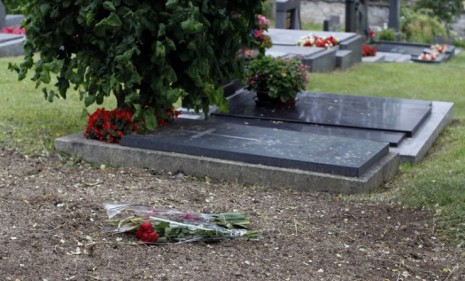Rudolf Hess' corpse: Is it wrong to dig up dead Nazis?
Leaders of the town where Hitler's deputy was buried got fed up with his neo-Nazi worshipers, and took drastic action

A free daily email with the biggest news stories of the day – and the best features from TheWeek.com
You are now subscribed
Your newsletter sign-up was successful
This week, the tiny Bavarian town of Wunseidel unearthed the remains of Rudolf Hess, Adolf Hitler's deputy, to discourage neo-Nazis from making pilgrimages to his grave. The bones were exhumed under cover of darkness, and cremated. The ashes were secretly scattered at sea. Neo-Nazis see Hess, who died in prison in 1987 at age 93, as a martyr, and hundreds, sometimes thousands, of them converged on Wunseidel each year around the anniversary of his death. Was this the right way to tackle the problem?
Yes. It eliminates a neo-Nazi shrine: The "grave had become a magnet for neo-Nazis," says Moe Lane at his blog, "and nobody wants those guys around." This is precisely why we threw Osama bin Laden's corpse into the Indian Ocean. Now, instead of all gathering at one spot, Hess' goose-stepping fans and bin Laden's "jihadi-wannabees" will flock to several different places and fight over whose shrine is best — "hopefully, with live ammo."
"Rudolf Hess and Osama bin Laden"
The Week
Escape your echo chamber. Get the facts behind the news, plus analysis from multiple perspectives.

Sign up for The Week's Free Newsletters
From our morning news briefing to a weekly Good News Newsletter, get the best of The Week delivered directly to your inbox.
From our morning news briefing to a weekly Good News Newsletter, get the best of The Week delivered directly to your inbox.
No. Desecrating a grave is always wrong: I don't have "an iota of respect for Hess," says Jeanne Sager at The Stir, "but he was a human being." It's just not right to dishonor his grave. It's easy to understand why the town leaders in Wunseidel would want to send Hess' extremist fans somewhere else, but they "have bypassed passive-aggressive tourist dissuasion methods and gone straight on into crazy town."
"Town that desecrated Nazi's grave should be ashamed"
Well, this was a last resort: The town tried everything to get the neo-Nazis to stop invading every August, says Karl Willi-Beck, Wunseidel's mayor, as quoted by The New York Times. Churches, political parties, and trade unions rallied in 2005 to have the extremists banned from gathering in the cemetery. But they kept showing up to lay wreaths, so the town got permission from the church to destroy the grave. "It was the right thing to do."
"Hitler aide's grave is removed to stop neo-Nazi pilgrimages"
A free daily email with the biggest news stories of the day – and the best features from TheWeek.com
-
 Political cartoons for February 16
Political cartoons for February 16Cartoons Monday’s political cartoons include President's Day, a valentine from the Epstein files, and more
-
 Regent Hong Kong: a tranquil haven with a prime waterfront spot
Regent Hong Kong: a tranquil haven with a prime waterfront spotThe Week Recommends The trendy hotel recently underwent an extensive two-year revamp
-
 The problem with diagnosing profound autism
The problem with diagnosing profound autismThe Explainer Experts are reconsidering the idea of autism as a spectrum, which could impact diagnoses and policy making for the condition